BOP's 50 Most Romantic Movies: 20-11
February 13, 2006
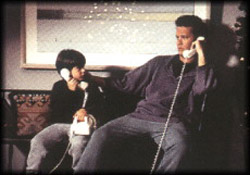 20) Sleepless in Seattle
20) Sleepless in Seattle
Most rom-coms have pretty much the same formula: Boy meets girl, boy loses girl, both boy and girl are miserable, boy wins girl back in the fourth act. But Sleepless in Seattle isn't like any other modern romantic comedy, and it certainly doesn't follow the formula.
For one thing, the Meet Cute, which isn't entirely, happens at the end of the film. Instead of the plot following the path the two lovers take to their eventual bliss, Sleepless in Seattle begins by dealing with loss, and plots the not-always-straight course lovers take in pursuit of the soul-mate that fairytales and films tell us we should all be trying to find. Tom Hanks and Meg Ryan's second screen pairing is also their most satisfying in terms of characterization and story; neither role is particularly saccharine or maudlin, and the plot has less the feel of fairytale than of being grounded in the reality that life can be rough on love, and happy endings are a rarity outside storybooks and scripts. But it's not all pessimism and doom-and-gloom; Sleepless in Seattle also holds out the hope for every hopeless romantic who has ever despaired of finding happiness, or finding it again, with its endearing message that sometimes, one finds even greater satisfaction with love the second - or 35th - time around.
Sleepless in Seattle also benefits from the fact that the other aspect in the romance, the son of Hanks' character, is written like a regular kid, instead of the oh-so-worldly wiseacre who's smarter than all the adults combined. The boy is mature enough to be worried about his dad's emotional well-being but still comes across as a young boy, instead of a miniature adult. The boy's call to a late-night talk show, hoping to find Dad a partner that will take him out of his funk and allow him to live again, sets the plot in motion, and it is the son's believability as a real person that places his father's tale of great love and loss in a context that takes what could have been a maudlin sequence and instead makes it poignant. The son is also helped by the addition of a playmate who is the epitome of the oh-so-wise child of most sit-coms and rom-coms, and whose very convention is another important piece of the plot puzzle.
In fact, Sleepless in Seattle departs so much from what has become the rom-com norm, and is so self-assured in its storyline, that it pokes gentle fun at the film many moviegoers see as the pinnacle of the weepie romance, An Affair to Remember, even borrowing somewhat from that film for its ending. But unlike the ‘50s tearjerker, Sleepless in Seattle has not a happy ending, but the promise of one; a new beginning for two people - and one very happy child - who have been buffeted by love's ups-and-downs but are still willing to strive for that elusive brass ring.
And this is why Sleepless in Seattle works: it refuses to take the easy route, to follow the expected rom-com path. It cuts down on the sloppy sentimentality in favor of a more realistic - for a movie, that is - look at life and loss and love. It is especially aided by toning down the gamine/sugary-sweet character that Ryan usually plays, providing instead a young woman who isn't sure she believes in magic, but who still hopes in her heart that maybe she can find it. Its unconventional ending holds the promise that is the quintessence of romance, rather than the near-impossible instant happy ending most rom-coms peddle. (Stephanie Star Smith/BOP)
|
|
|
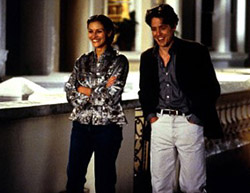 19) Notting Hill
19) Notting Hill
Several decades after one Grant ruled the rom-com roost, another came to stake his claim. Carving out his own niche in the romance film market, that of the somewhat awkward suitor who seems always on the verge dashing off before finally stammering out his true feelings, Hugh cut quite the different figure from suave, assured Cary. As it turned out, however, he was exactly what the moviegoing public wanted in their rom-com hero in the last decade of the 20th century: self-deprecating, slightly insecure, with a sense of humor and a sensitivity that enhanced his masculine appeal.
Notting Hill finds Hugh Grant costarring with America's then-Sweetheart, Julia Roberts, in the tale of an ordinary working bloke in love with an international movie star. And though the film hewed to the rom-com conventions - the Meet Cute, boy and girl fall in love, boy loses girl, etc - it soared above the mediocre norm by treating its characters as real people instead of cardboard cutouts following by rote a by-the-numbers script. What could have been a superficial story about star-crossed lovers from the proverbial two different worlds, male ego versus female fulfillment, blah, blah, bliddy blah, became instead a rumination on the difficulties any relationship faces, even when there isn't the added pressure of having it take place under the white-hot glare of celebrity.
The script by Richard Curtis - who also wrote the film that made Grant an international star himself, Four Weddings and a Funeral - succeeds by keeping its focus on the human portion of the plot. It reminds the audience that there are human beings underneath all the glitz; that the star, as Roberts' character puts it so poignantly at one point, is also a girl asking a boy to love her. Notting Hill is sweet without being sickly so, charming without turning a blind eye to the less appetizing sides of relationships, reminding the audience that while love may conquer all, it requires some work to do so. (Stephanie Star Smith/BOP)
Whenever I think of romantic moments in cinema, there are two scenes that spring to mind. One of them will be discussed in the top ten and the other occurs in Notting Hill. There is a sincere, realistic date sequence where a couple climbs a fence and sits on a bench. Describing it in words makes it seem far too simplistic to be emotionally impacting, but don't let that fool you. As Ronan Keating croons a masterful cover of When You Say Nothing At All, the couple proceeds to step beyond their fears, insecurities and character flaws long enough to fall in love. The fact that he is a nobody and she is a glamorous movie star is irrelevant at that moment. They are simply two people spending a night together in a private park. To make the sequence more romantic, the fledgling couple reads a plaque indicating they were not the first lovers to do so. The power of the moment is profound. At the end of the day, we are all ordinary people falling victim to the capricious whims of love and fate. This one scene drives that point home as well as any I have ever watched. Notting Hill is a wonderful movie from start to finish but during these two minutes of screen time, it is absolutely perfect. (David Mumpower/BOP)
How Well Do You Know: Notting Hill
|
|
|
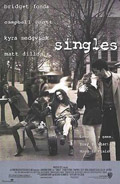 18) Singles
18) Singles
Cameron Crowe has a singular talent for making unusual love stories work. In Singles, he worked around not just one, but several different couples in various stages of romance. At the center are Steve (Campbell Scott) and Linda (Kyra Sedgwick), who make a beautiful couple indeed. Anyone who doesn't just fall over at the sweetness of the line "I just happened to be nowhere near your neighborhood" has no heart. Their romance isn't simple – bad things happen and they are torn apart for a time – but ultimately, it is their story that makes the movie tick.
Along with Steve and Linda, we also see the strange, possibly one-sided romance between Janet (Bridget Fonda) and Cliff (Matt Dillon). Janet is a funky, artistic type who is absolutely devoted to Cliff, who doesn't particularly care or notice as he his obsessed with the development of his band, Citizen Dick. By the end of the film, though, he comes to appreciate Janet's many charms, and sets out on a mission to win her heart. It's a cute segment of the story, and Dillon's performance is terrific (seriously, watch this instead of Crash).
Finally, we see the travails of Debbie (Sheila Hunt) as she navigates through the world of dating. A materialistic, superficial girl, she's willing to take a guerilla approach to finding a mate – even if it means pretending to love bicycling when she actually despises it.
The story is set in the midst of the Seattle grunge scene, which makes for a particularly fine musical backdrop. Members of both Pearl Jam and Soundgarden appear in the film, though none of them are particularly involved in the romance. Even so, the Paul Westerberg song "Dyslexic Heart" is the perfect theme for a group of young people who work their way through complex emotions and the necessity of growing up...just a little. (Kim Hollis/BOP)
|
|
|
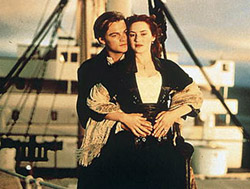 17) Titanic
17) Titanic
I know what you're thinking. The hype surrounding Titanic was larger than the ship itself in 1997. But once you get over all the box office talk and Oscar count, what you find is a really sweet love story tucked in around one of the most infamous events in history. Jack Dawson (Leonardo DiCaprio) and Rose De Witt Bukater cross paths quite by accident on the luxurious ocean liner. After all, he's down below in the lower class bunks and she is up on deck in the penthouse of the ship, if you will. This was another story of forbidden love where the wealthy girl is ready to give up everything for the poor schlub she loves. Lost in the amazing effects and grand scale of the film is the chemistry between Leo and Kate. Their characters really do carry the film, every bit as much as the unavoidable demise of the ship. Refusing to let him out of her sight, Rose jumps out of a lifeboat to stay with her man. Sticking together no matter what, rarely has a love as strong and pure as the love between Jack and Rose been seen on screen. The moment Rose finds that Jack has met his end and then pulls herself up by her bootstraps to survive is one of the more powerful scenes in the movie and still gives me goose bumps even now. (Jim Van Nest/BOP)
Selling the most successful film of all time as a worthy choice for this list shouldn't be that hard. Oddly, though, a negative association has grown over time. Part of it is the fact that James Cameron relished the movie's success a bit too much. Part of it is that people got tired of 13-year-old girls giggling at every shirtless photograph of Leonardo DiCaprio on the web. But the overwhelming majority of it is that disgusting Celine Dion song. The damn thing is such an aggravating ear worm that the Vincent Van Gogh Maneuver begins to look appealing after a couple of listens.
All of the criticisms Titanic has absorbed over the years are largely invalid, though. At the end of the day, it's still an amazing cinematic accomplishment in terms of cinematography and storytelling. The intricate nature of the plot evaluates the real passengers of the doomed luxury cruiser through a fictional tale of class structure. Prior to the movie's release, only History Channel buffs would have known that each level of the vessel was represented by financial status. Cameron's elaborate methodology shows the differences between the Jack Dawsons of the world from the Cal Hockleys, Rose DeWitt Bukaters, and Molly Browns. But when the ship attacked an innocent iceberg that was just out in the middle of the ocean minding its own business, the monetary wherewithal the Haves possessed meant nothing. Similarly, the ability of the Have Nots to do a world class Irish Jig was useless as well. Everyone faced the same mad struggle for survival and Cameron found a way to impeccably represent this through the nature of the hopeless relationship between Rose and Jack. Incendiary love that can't last is the greatest of all fantasies, and Titanic has it in spades. (David Mumpower/BOP)
How Well Do You Know: Titanic
|
|
|
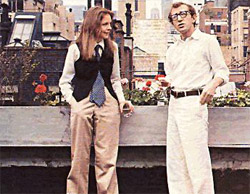 16) Annie Hall
16) Annie Hall
More than most other folks in the entertainment world, long-time director Woody Allen is generally viewed in the love-him or hate-him category. Some people don't like his methods of talking to the audience, or inserting himself as the main character in most of his movies, and others simply consider his movies to be dull or unexciting, or just more of the same every time. Perhaps some even hate him because, to them, his Annie Hall will be forever remembered as that film that beat Star Wars at the Oscars.
Allen stars as Alvy Singer, a neurotic comedian from New York, very much a precursor to Seinfeld's George Constanza. Diane Keaton is Annie Hall, a neurotic aspiring actress and singer from New York. The movies details a series of comic misadventures in which Alvy deals with his relationship problems and his search to find love. He may have finally found it in Annie, but their personal issues keep getting in the way. Blending slapstick comedy and fantasy in an unusual way, the movie successfully paints a picture of how surreal romantic relationships can really be. Especially for these people.
Some of the moments are hilarious, such as an unfortunate sneezing incident, a psychotic Christopher Walken before he was a caricature, and a sequence where the conversation on screen doesn't quite match the subtitles explaining what is really being said. (Michael Bentley/BOP)
|
|
|
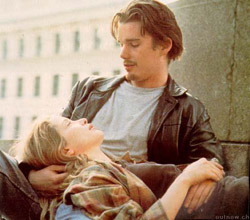 15) Before Sunrise
15) Before Sunrise
We've already covered this film's sequel, Before Sunset on our list, so it's only natural that the movie that began it all would place even higher. A small, intimate story about two college-age people who meet on a train in Europe, Richard Linklater's glorious exploration of what is essentially love at first sight is impacting and has a resonating effect on those who watch it.
The story solely follows the path of Jesse (Ethan Hawke) and Celine (Julie Delpy), as they turn their chance encounter into something much deeper and more significant. After crossing paths on the Budapest-Vienna train, Jesse suggests that they should make a spontaneous stop in Vienna, where they will stay for 14 hours as they talk about politics, education, growing up and the ethereal nature of love. Through it all, the pair fully realizes that the time will come when their brief relationship will have to come to an end. It's bittersweet, but those who have seen both Before Sunrise and Before Sunset know that resolution will come – eventually. The chemistry between Hawke and Delpy is magnificent, and the script is absolutely masterful. Before Sunrise is almost devastatingly romantic, particularly for those who like their love stories infused with a heavy dose of intelligence and wit. (Kim Hollis/BOP)
|
|
|
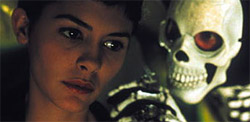 14) Amelie
14) Amelie
A fanciful, colorful, humorous portrayal of a woman on a quest for romance and happiness, Amelie is the film that truly introduced the world to the wonderful Audrey Tautou. An engaging young sprite who brings to mind Audrey Hepburn, it is her performance that makes the film work as well as it does. Whether she's stealing lawn gnomes or cracking the top of her crème brulee with a spoon, Amelie is instantly the most charming young woman you could ever hope to know.
The story is whimsical and original. After Amelie returns a long-lost childhood treasure to the man who used to live in her apartment, she becomes determined that she should bring happiness to everyone she encounters. She works as a waitress in a Paris café, where her interaction with customers can be quite curious. One young man in particular, a collector of discarded photo booth pictures, piques her interest and her pursuit to uncover what makes him tick is both an unraveling of a mystery and a slowly developing love story. The tale is set against the wondrous backdrop of Montmartre, with scenery so glorious it can occasionally take your breath away. But in the end, the real romance is between the audience and the central character, as we constantly root for her even in the strangest of her quests. (Kim Hollis/BOP)
|
|
|
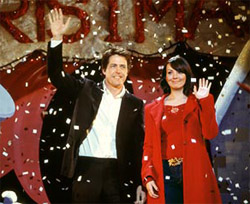 13) Love Actually
13) Love Actually
This Brtitish ensemble piece from writer-director Richard Curtis has as its very theme the exploration of love in all its various categories. For starters, perennial romantic comedy centerpiece Hugh Grant portrays the country's Prime Minister, who happens to find himself attracted to one of his employees (Martine McCutcheon). He fires her, though, feeling that such a relationship is inappropriate. Still, in the end, he winds up navigating the streets of London in an effort to find her home. And despite a valiant effort to keep their romance secret, they are revealed in hilarious fashion – though not in an overly embarrassing way.
The relationship between Harry (Alan Rickman) and Karen (Emma Thompson) is of a different nature altogether. Married for years, they have reached a point of stagnation and Harry seeks out attention from a hot office mate. Karen is devastated by the discovery, and yet they seem to carry on for the sake of their children.
Probably the most touching of the stories is that of Jamie (Colin Firth) and Aurelia (Lùcia Moniz). After finding his girlfriend with his brother, Jamie escapes away to France so that he can work on a novel. While there, he develops feelings for his maid, Aurelia, even though they don't speak the same language (she is Portuguese). The language barrier makes for some wonderful humor and Firth is ideal in the role.
As for the remainder of the group, there's a love triangle between Chiwetel Ejiofor, Keira Knightley and Andrew Lincoln; the sweet father-son relationship between Liam Neeson and Thomas Sangster; and Bill Nighy's rock star trying to capture the #1 Christmas record as he realizes that his manager and friend is really the best thing to ever happen to him. It's an intricate weaving of plots and I haven't even covered the half of it, but the reward is well worth the effort. Love Actually is an ingenious little film that employs wit, vitality and intellect to convey its message. (Kim Hollis/BOP)
|
|
|
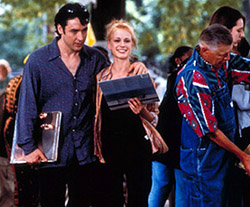 12) High Fidelity
12) High Fidelity
It is most warmly remembered for things like the wacky antics of music-obsessives Dick (Todd Louiso) and Barry (Jack Black), and the many inane top five music lists that are always being bandied about in Rob's (John Cusack) record store. Somebody's father dies? Top five songs about death. Somebody with no taste tries to buy "I Just Called to Say I Love you"? Top five musical crimes perpetrated by Stevie Wonder in the '80s and '90s.
And Rob is constantly making top five lists about other things in life too, such as his desert-island all-time top five most memorable breakups. High Fidelity actually excels in the little ways that record store owner Rob thinks about and reminisces about Laura, the love of his life. She has just broken up with him (his fault), and while he tries to be optimistic at first, he knows that he needs her and wants her back. When he finally tells us the five things he misses most about her, you honestly believe him. And, of course, the list is hilarious: such as the way she smells and that "she does this thing in bed when she can't get to sleep - she kind of half moans and rub her feet together in equal number of times, it just, kills me!"
Perhaps my favorite scene in High Fidelity is just a little one where Rob and Laura are talking briefly in his apartment. Rob has made a list of his top five dream jobs (four of which would require time travel, such as "Producer, Atlantic Records, 1964-1971"). Laura reads the list, remarks on the absurdity of it and crosses out the fifth choice (architect) and writes in "record store owner." It completely nails, in just that brief moment, the relationship between the two; he needs her, but while she won't say it - she could use him too. Surely few of us do not have at least something to relate to in Rob (or Laura) or in the way that they deal with their ever-shifting passion and desire for one another. One of my top five favorite movies of all-time. (Michael Bentley/BOP)
I recently heard a radio interview with Cameron Crowe where he discusses the notion of doing a sequel to Say Anything... He says that while the idea of continuing the story is appealing, the truth of the matter is that it was effectively done already with High Fidelity. While I'm not entirely sure that I agree (my hope for Lloyd Dobler is that he never be as disillusioned as we see Rob Gordon at points in High Fidelity), I do think there is some validity to the statement. Like Lloyd, Rob is quirky and confused in his dealings with women. His idiosyncratic personality pushes him to obsess about music to the point that it can be damaging to his relationships. The real clue, though, that Rob Gordon can't possibly be a grown-up Lloyd is that he is selling something for a career. I simply can't buy that Lloyd would compromise his principles like that.
But, of course, I digress.
High Fidelity is based on the marvelous novel by Nick Hornby, and follows the soul searching quest of Rob Gordon (John Cusack). He owns a record store, where he and his employees (a frenetic Jack Black and Todd Louiso) spend their days making lists (such as top five musical crimes perpetuated by Stevie Wonder in the '80s and '90s or top five songs about death). But the real meat of the story is Rob's attempt to understand why all his relationships have gone wrong in the past. He is spurred to do this when his girlfriend, Laura (Iben Hjejle) dumps him. Despite his contention that she doesn't even fall in his top five breakups, there's something that remains between them throughout the film, even as she has a serious relationship with a patchouli freak named Ian (Tim Robbins).
Ultimately, as Rob realizes, it is Laura who truly knows him and understands what makes him tick. We leave him as he realizes where his future lies. "I've started to make a tape ... in my head ... for Laura. Full of stuff she likes. Full of stuff that makes her happy. For the first time I can sort of see how that is done." (Kim Hollis/BOP)
|
|
|
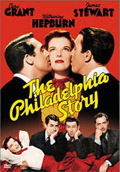 11) The Philadelphia Story
11) The Philadelphia Story
Cary Grant and Katharine Hepburn made for such a winning screen combination, they appeared in four films together, beginning with Sylvia Scarlett in 1935. Their next film pairing was the quintessential screwball comedy Bringing Up Baby, followed by the low-key romance Holiday. Their final screen outing was The Philadelphia Story, adapted from the hit Broadway play of the same name. Although its tale of the bickering divorced couple who still obviously love each other very much and are clearly destined to be together isn't a novel one - in fact, Grant played much the same plotline with Rosalind Russell in 1940's His Girl Friday - The Philadelphia Story rises above the rest by virtue of its whip-smart dialogue and intelligent script. Back before Hollywood started playing to the lowest-common denominator, moviegoers were treated as having a modicum of intelligence, and movie scripts were written with this in mind. So unlike the watered- and dumbed-down fare that too often passes for rom-coms today, the plotlines of classic romantic comedies were more involved, and while the audience always had a couple they were rooting for, it was never a (completely) foregone conclusion that things would work out.
And so it is with The Philadelphia Story, and its tale of spoiled socialite Tracy Lord about to marry respectable - and boring - George Kittridge, a man who couldn't be more the complete opposite of her ex-husband, C. K. Dexter Haven. Or more the opposite of her, for that matter. The fun begins when Haven, along with tabloid reporter Macaulay Connor - played by Hollywood's favorite Everyman, Jimmy Stewart - and his photographer and sidekick Elizabeth Imbrie, who has designs on Connor, crash the pre-wedding celebrations, with Haven bent on showing Lord just how very much she misses him and how very right they are for each other, and Imbrie hoping to convince Connor that love and marriage don't have to bring careers to an end. In the process, Tracy learns a few things about herself, some of which she doesn't like; Connor discovers that this whole love business might not be such a bad thing after all; and Haven and Imbrie come very close to losing their respective loves when Cupid's arrows go awry. At least temporarily.
The Philadelphia Story has such a cast of characters - in the "quite the" sense - that it could easily have collapsed under the weight of so many quirky personalities vying for attention. But in the capable hands of veteran romantic drama and rom-com scripter Donald Ogden Stewart, each part is woven into the fabric of the story in the most harmonious manner, and the end result is a colorful, effervescent tale that crackles with wit yet still wears its heart quite beautifully on its sleeve. There is ultimately a happy ending, of course, as is required of romantic comedies, but as is sometimes the case in life, you aren't entirely sure until the final scene just exactly what that happy ending is going to be. (Stephanie Star Smith/BOP)
|
|
|
|
|
|
|

